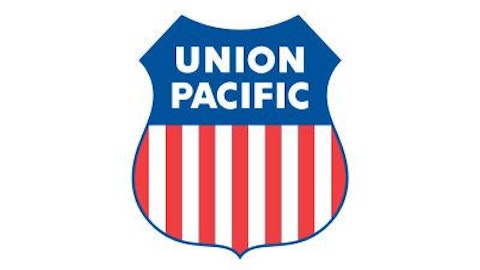Warren Buffett will turn 83 in August, which means that according to the Social Security Administration’s period life table, the world’s greatest living investor will have a 91.3077% chance of blowing out all those candles again in 2014 – betting odds, if ever there were any. However, sooner or later, investors in Berkshire Hathaway Inc. (NYSE:BRK.A) are going to have to come to grips with the fact that one day both Buffett and Charlie Munger will be gone. (Buffett is already the fourth-oldest CEO in America. Munger is 89.)
What happens then?
A Buffett-less Berkshire

Auto-pilot portfolio
Baby Berkshires
While Buffett has made clear that any succession will ultimately be under the controlling influence of the Buffetts and Mungers, and that control of Berkshire Hathaway Inc. (NYSE:BRK.A) will only be awarded under the strict condition that Berkshire will continue to be run as it always has been, the fact remains that the larger Berkshire Hathaway Inc. (NYSE:BRK.A) gets, the more difficult it is for the conglomerate to consistently beat the markets. (Both Buffett and Munger have admitted as much.)
Berkshire look-alikes
Conclusion
Together, these companies represent some of the best low-risk, high-margin performers in the market today. The competitive advantages of Berkshire’s component companies won’t just disappear overnight just because Buffett is gone.
One of the most admirable attributes of Buffett’s portfolio is that it essentially runs on auto-pilot. Berkshire’s “hands-off management” policy typically leaves existing management in charge of its subsidiaries’ affairs.
The real danger is that Berkshire will ultimately be a victim of its own success. In other words, the danger isn’t that the stock will plummet in the post-Buffett era, but that the collection of low-debt, high-margin companies that Buffett has collected will be a temptation that’s simply too good for Wall Street to resist borrowing money against in the global debt markets.
The problem is one of scale. Size is not only (in Buffett’s own words) “the anchor of performance,” it significantly limits the company’s options with regard to spinoffs. While some of Berkshire’s subsidiaries (See’s Candies, Borsheim Jewelry Company) are small caps, many others (think: H.J. Heinz Company (NYSE:HNZ) and Burlington Northern) are market leaders. That makes it significantly harder for competitors and would-be empire-builders to chop them up and digest.
It’s no secret that Berkshire “look-alikes” like and W.R. Berkley Corporation (NYSE:WRB) are in many ways already performing roughly on par with Berkshire, and have considerably more room for rapid growth. Like Berkshire, Alleghany Corporation (NYSE:Y) reinvests the float from its insurance operations in a well diversified portfolio of over 60 publicly traded companies. Like Berkshire, Alleghany trades very near its book value, with a 1.003 price-to-book ratio (vs. 1.454 for Berkshire) and has very little debt. From 1967-2007, Alleghany returned an average of 15% to investors (vs. 21% for Berkshire).
Niche insurer W.R. Berkeley has generated a 17% compound total annual return of 17% between 1983 and 2008, and 16.9% average return-on-equity over the last 10 years.
One of the most enticing things about W.R. Berkeley is how deeply management’s interests are aligned with that of shareholders. All of WRB’s top 300 employees have a significant stake in the company. (The founder of the company, William R. Berkeley, owns 20%.) By deferring restricted stock units until retirement and subjecting those RSUs to clawback provisions, management has managed to pull off something truly unique in corporate America: a focus on long-term value.
What W.R. Berkeley lacks is an equity portfolio. The pie chart below breaks down WRB’s investment allocation strategy by security type.
(Source: Bank of America Merrill Lynch 2013 Insurance Conference)
As you can see, the company is extremely overweight fixed-maturity bonds, cash, and cash equivalents. Only 2% of WRB’s portfolio is in stocks. While this eliminates interest-rate risk, it also acts as an anchor on the stock. For a $5.8 billion company with 30-year track record of delivering steady returns to investors, WRB’s current allocation strategy may be too timid to match Buffett’s performance.
Ultimately, Berkshire’s responsibility to its shareholders may leave its board with no choice but to spin off three or four “Baby Berkshires,” each run by a different CEO. Even if the company is never broken up, a sufficiently organized group of large Berkshire stakeholders could press management into paying out regular dividends during a severe economic downturn.
For the moment, Buffett and Munger’s succession plan will likely ensure a smooth transition in the near to mid term, but activist challenges and the obligation of Berkshire’s board to maximize shareholder value paint a more uncertain picture of Berkshire’s long-term future.
Such developments aren’t necessarily a bad thing. On the contrary: Buffett’s preference for price-to-net-asset value approach to valuation over traditional price ratios like price-to-earnings or price-to-book and disdain for creative GAAP accounting all but guarantees a windfall for investors should the conglomerate ever be broken up.
Of course, investors would have to find somewhere else to put their money. And that, along with the loss of Buffett and Munger’s wisdom, is the real tragedy.
The article What Will Happen to Berkshire After Warren Buffett Dies? originally appeared on Fool.com.
Jessica McCann has no position in any stocks mentioned. The Motley Fool recommends Berkshire Hathaway. The Motley Fool owns shares of Alleghany and Berkshire Hathaway. Jessica is a member of The Motley Fool Blog Network — entries represent the personal opinion of the blogger and are not formally edited.
Copyright © 1995 – 2013 The Motley Fool, LLC. All rights reserved. The Motley Fool has a disclosure policy.






